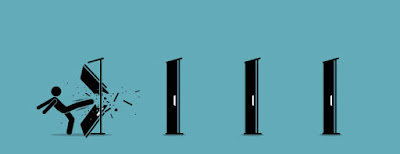 |
Creator: Jeremy Credit: Getty Images/iStockphoto
|
All of those simple acts are....wait for it...acts. They are initiated, meaningful actions that affect something outside themselves.
That's why it's important as leaders in the world of business to be tuned into and mindful of this simple truth. Why?...because everyday, we're bombarded with information dangling the next big thing in front of us that distracts from and undermines the usefulness and power of the simple. And the irony, usually, the simple cost much less.
It's with this in mind that I bring us back to the series on being an effective executive/leader. In my previous post I shared some eye-opening finds from Peter Drucker's book The Effective Executive. One of which is this: Being effective is not complicated, but actually rather simple. It is the habitual practice of a few strategic actions. He stated, "Effectiveness is a discipline".
And yet he says: "Additionally, after years of observation and working with a volume of diverse leaders in a variety of corporate structures - non-profits, government as well as traditional c-suite, he sees effective executive leadership as incredibly valuable and equally rare."
So why do you think that is?...and as my title suggests, if it's so simple why aren't more people doing it?
I offer a few ideas in this post Is Investing in Leadership Development a Waste of Money?, but for this one, I want to focus on what I think it the main reason. Here we go.
An act can be simple - even easy - but enacting change can be hard... particularly in the ways and at the level we're talking.
In fact Mr. Drucker didn't say being effective would be easy, he merely states it's simple. He goes on to share the circumstances that challenge the habitual practices needed to be effective and suggests that to win over the challenges, one has to be very intentional, strategic, determined and clear-minded. It's got to matter enough to fight the built in internal forces that work against the action one needs to take. In this case, the force is not with you. He calls them "4 organizational realities of which one has little to no control". Here they are...
1. An executive/leader is somewhat captive to their organization - there are appropriate, unexpected demands on their time.
2. Executive/leaders are forced by the force of their operation to keep doing exactly what they're doing unless they take intentional, determined action to do otherwise, starting with changing the reality in which they work.
An example of this is an emerging or recently promoted senior leader operating out of the mindset and work habits of their former position. Adopting a new mindset and actions to be successful in the new role doesn't automatically happen the day of promotion. Human behavior just doesn't work that way. And yet, even for many with very little help, that is what is expected. This is doubly challenging when (and this is common) a technical expert is promoted into management.
3. This next one is interesting (and makes the case for why Drucker includes organizational effectiveness in the criteria for being an effective executive). Effectiveness is related to the organization itself, meaning "...one is only effective if and when other people make use of what he/she contributes. Organization is the means of multiplying the strength of an individual." This reality suggests that to be effective, an executive's reach must not be just at the top of an organization, but as Drucker puts it, "throughout".
4. An executive can be swallowed up with activity within an organization and may not take the time to see without - they become "inside focused". And so, he/she may rely on filtered info from within regarding outside results rather than gaining fresh, first hand knowledge. This is the critical info, which reflects the ultimate results and is key to making the best decisions for the best outcomes.
In truth - the outside is the most important reality, but the inside is all they see...they become insulated from critical information unless they make a special effort to gain direct access to outside realities.
This dilemma is perfectly demonstrated by the show Undercover Boss. The corporate execs are usually amazed when they find out real truths about what's happening and why "outside" the corporate structure. Those situations are what an executive's decisions are supposed to positively impact, yet many have very little accurate information regarding them.
This also reminds us of the conditions leaders create from a culture where they are told what they want to hear vs. what they need to hear. This presents a whole other issue when leaders have "yes" folks around them, discouraging conflict, dissent and critical thinking. Without realizing it, they're sabotaging their own effectiveness.
So, we can see that simple isn't necessarily easy - which brings me to the key message of this post. If you want to become effective, which in my and Drucker's view - really is a professional imperative - you'll need to make it your mission to do so and enlist help to ensure you succeed. You'll need alternate, more powerful forces to combat the current forces working against you.
There are 2 choices then - get help within or get help without...and from my work in behavior change, you probably will need both. Ironically, these actions are pretty simple too and I'm happy to help. Email me with any questions you may have or to set up a quick chat. joann@manageglobal.solutions.
No comments:
Post a Comment